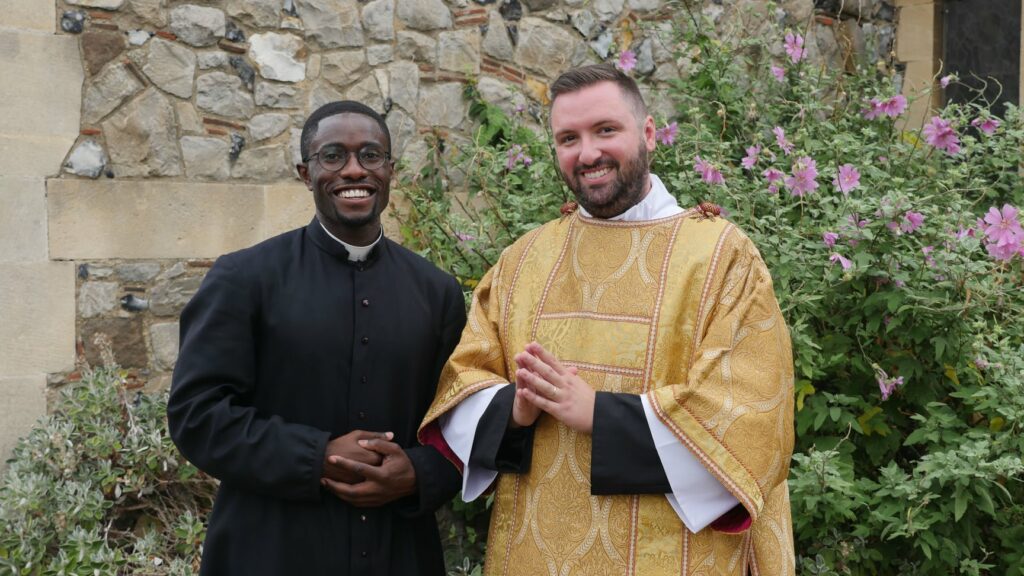What do I need?
Applying for the Catholic Priesthood

To apply for the catholic priesthood in the UK you need to be a single practising catholic man who has never been married. Exceptions to this rule would be If you have received an annulment from a previous marriage or are an older man who has been widowed.
If you are married and you are a minister in another Christian denomination a provision for Episcopalian and other Protestant ministers who were married and wanted to remain active in their ministry after their conversion to Catholicism was made in 1980. This provision has been continued and expanded by both Pope Emeritus Benedict and Pope Francis; however, these are exceptions to the rule of celibacy, if you are in this situation then please contact Fr. Michael Halsall on frmichaelhalsall@gmail.com Tel: 01702 466998 – Mobile: 07967 498589.
Vocation basics
When applying for the catholic priesthood you would have to speak to your vocations director which n the Brentwood diocese is Fr.Graham Smith. He can be contacted at vocdir@dioceseofbrentwood.org
References
Once we have spoken, prayed together and discerned a calling from God to the priesthood I would ask for references from your parish priest, your workplace (if applicable), your most recent place of study and a character reference. I will also ask you to write a short essay on your discernment journey.
DBS certificate
As an important part of our commitment to safeguarding we also ask for a certificate from the Disclosure and Barring Service (DBS) who carry out the functions previously undertaken by the Criminal Records Bureau (CRB) and the Independent Safeguarding Authority (ISA).
The certificate will contain details of both spent and unspent convictions, cautions, reprimands and warnings that are held on the Police National Computer, which are not subject to filtering.
Confidentiality
Whilst your application will be handled in a professional manner regarding confidentiality, it is important that candidates recognise that information gleaned during the process is not akin to material covered by the ‘seal of the confessional’. Spiritual Direction must be kept wholly separate from Selection, even though both may be dealing with similar material at an important stage of an individual’s life.
A file regarding your application will be securely kept by the Vocations Director which will include: your Application Form, medical and psychological reports, references, reports written about you by bodies who interview you and any correspondence. Please note that this will form a chronological ‘structured file’ for the purposes of the General Data Protection Regulation (GDPR) enforced on the 25 May 2018. The information you provide in your application will only be used for the purposes for which it was given (unless, for example significant issues arise regarding the protection of vulnerable people).
If you are accepted for formation, records from your training will be added to this file, and if you are eventually ordained, the file will become part of your diocesan record. If you are not accepted, or later withdraw from formation, your file will be kept in case you apply to another diocese or religious community at a later date (in which case information may be shared with your consent). Those involved with your formation, should you be accepted, will be given relevant information from your file. Your records will not be passed on to any person not involved with your selection and formation without your written consent; however dioceses may be required by law to disclose records in rare circumstances.
Medical
You will be required to undergo a thorough medical examination as part of the Selection Process. Your Vocations Director will give you the appropriate forms to take to your doctor.
Psychological assessment
Candidates are required to undergo a psychological assessment with a psychologist who is currently practising and who has knowledge of the life and ministry of priests. This is carried out so that the bishop can take your psychological health into account when making a decision. The psychologist will explain the purpose of the assessment and their terms of reference to you. The assessment is viewed as being of service to both the diocesan bishop and yourself. The psychologist will prepare a report for you and the diocesan bishop (and possibly his advisors). The report, or aspects of it, will also be helpful to those involved in your priestly formation if you are accepted. Normally the rector of any seminary you attend will receive a copy of the report; however you do have the right to withhold this information if you choose to do so. Please consult with your Vocations Director if you have any questions in this regard.
Vocations Stories
Good Shepherd Sunday
Michael Barwick - Message for Good Shepherd Sunday...
Saint of the Day
- St. Philip Neri
St. Philip Neri Feast date: May 26 Philip Neri was born in Florence, Italy, in 1515. At the age of 18, Philip was sent to his uncle, Romolo, a wealthy merchant at San Germano, a Neapolitan town near the base of Monte Cassino, to assist him in his business, and with the hope that he might inherit his uncle's fortune. He gained Romolo's confidence and […]
- May. 26 Memorial of St. Philip Neri, Priest; Minor Rogation Day, Memorial
Today is the Memorial of St. Philip Neri (1515-1595), who was born in Florence and died in Rome. He lived a spotless childhood in Florence. Later he came to Rome and after living for fifteen years as a pilgrim and hermit was ordained a priest. He gradually gathered around him a group of priests and established the Congregation of the Oratory. He was a man of original character and of a happy, […]